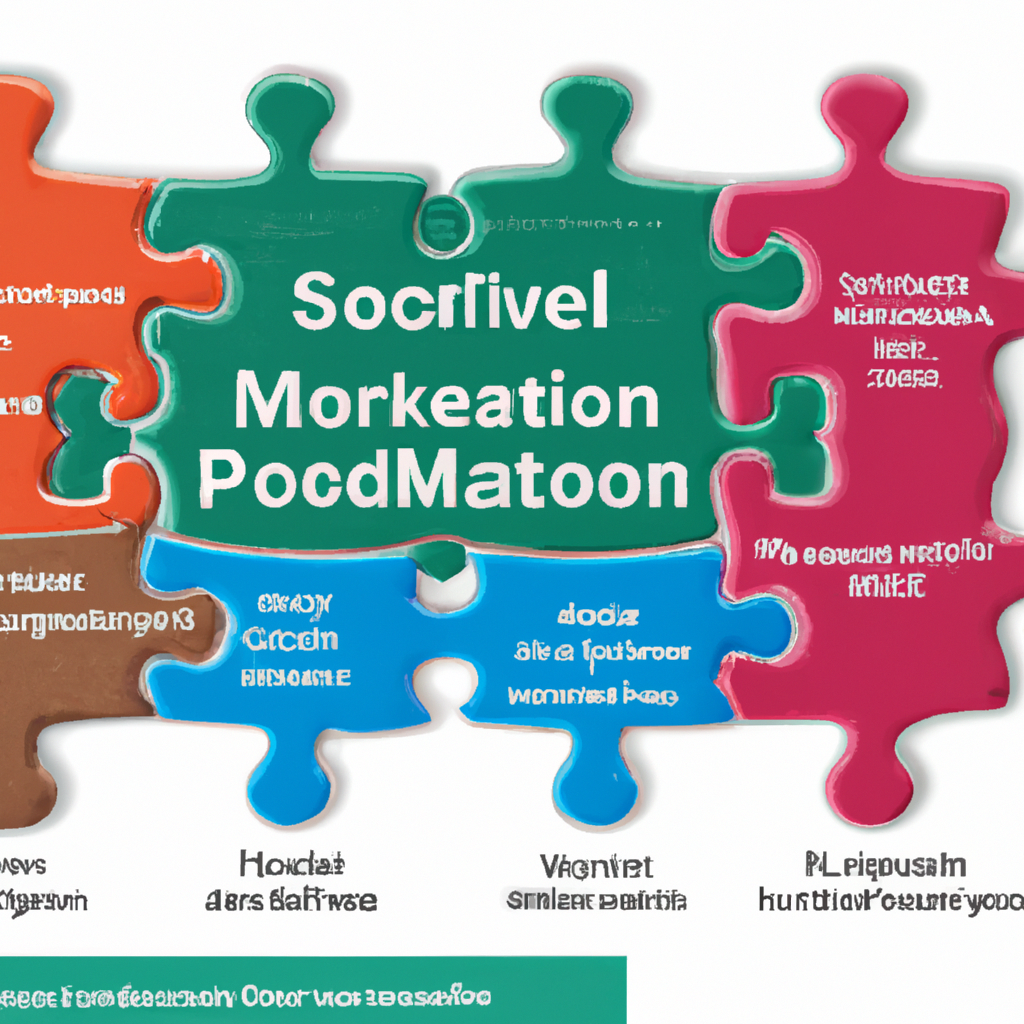Are you a business owner or marketer looking to streamline your marketing efforts and improve efficiency? If so, choosing the right marketing automation software is crucial. With the abundance of options available, it can be overwhelming to determine the best fit for your needs. In this article, we will guide you through the process of selecting the perfect marketing automation software that will help you achieve your goals and take your marketing to new heights. So, let’s dive in and discover how you can make an informed decision that will revolutionize your marketing strategy.

Determine Your Marketing Goals
To choose the right marketing automation software for your business, it’s essential to first determine your marketing goals. This will help you identify the specific objectives you want to achieve through your marketing efforts. Whether it’s increasing brand awareness, generating leads, or improving customer retention, having clear and defined goals will guide you in selecting the software that aligns with your objectives.
Consider your overall marketing strategy as well. Your marketing automation software should seamlessly integrate with your overall strategy and support the various tactics you employ. It should complement your existing marketing efforts and help streamline your processes, rather than creating additional work.
Evaluation of your current marketing processes is another crucial step. Understanding how you currently handle marketing tasks, such as lead nurturing, email campaigns, and social media management, will provide insights into the functionalities and features you need in your marketing automation software. It will help you identify the gaps in your current processes and areas where automation can streamline and optimize your efforts.
Assess Your Budget
Once you have a clear understanding of your marketing goals, it’s important to assess your budget. Determine how much you can allocate to invest in marketing automation software. Consider both your available budget and any long-term costs associated with the software.
While it’s tempting to be swayed by the allure of feature-rich platforms, it’s crucial to ensure that the software you choose fits within your budget. Remember that the cost of the software is not the only expense. You might also need to allocate resources for implementation, training, and ongoing maintenance.
It’s also important to factor in the potential return on investment (ROI) when evaluating your budget. Consider how the software will contribute to the growth and success of your business. Will it help you generate more leads, improve customer retention, or increase revenue? Understanding the potential ROI will help justify the investment and prioritize the software that can deliver the most value.
Evaluate Features and Functionality
To select the right marketing automation software, it’s essential to carefully evaluate the features and functionality offered by different platforms. Consider the specific automation needs of your business and ensure that the software provides the necessary tools to meet those needs.
Look for features such as lead scoring, email marketing automation, customer segmentation, social media management, analytics, and reporting. Assess whether these features align with your marketing objectives and can effectively support your strategies.
Ease of use should also be a primary consideration when evaluating software options. Choose a platform that offers a user-friendly interface and intuitive navigation. Your marketing team should be able to quickly adapt to the software without extensive training or technical expertise.
Furthermore, review the available integrations and compatibility with other tools and systems you currently use. The automation software should seamlessly integrate with your existing CRM, email service provider, content management system, and other marketing tools. This will ensure a cohesive workflow and avoid any disruptions in your marketing processes.
Analyze Scalability and Flexibility
When selecting marketing automation software, it’s important to analyze its scalability and flexibility. Consider not only your current business needs but also future growth opportunities.
Assess how well the software can accommodate your growing customer base and an increasing volume of marketing activities. Look for platforms that offer flexible pricing plans or the ability to scale up as your business expands. Consider whether the software can handle larger databases, manage more complex automation workflows, and support increased user activity.
Similarly, evaluate the flexibility of the software to adapt to changing needs. As your marketing strategies evolve, your automation software should be able to support new tactics and technologies. It should provide the necessary agility to implement new campaigns, respond to market trends, and adjust strategies accordingly.
By choosing a scalable and flexible marketing automation software, you can future-proof your marketing efforts and avoid the need for migrating to a new platform as your business grows.

Research Vendor Reputation
Before finalizing your decision, it’s crucial to research the reputation of the vendors offering marketing automation software. Look for customer reviews and testimonials to gain insights into the experiences of other businesses.
Pay attention not only to positive feedback but also to any recurring complaints or concerns. This can help you identify any potential issues or limitations that you may encounter. Look for trends in reviews, such as poor customer support or software glitches, to make an informed decision.
Industry recognition and awards can also serve as indicators of a reputable vendor. Consider whether the software provider has received any accolades or recognition for their product or services. While awards alone may not be definitive, they can add credibility and signify the vendor’s commitment to quality.
Finally, evaluate the vendor’s track record in terms of reliability and consistency. Look at their history in the market and their performance over time. Consider whether they have a reputation for delivering reliable software and maintaining strong customer relationships.
Consider Customer Support and Training
When selecting marketing automation software, it’s essential to consider the level of customer support and training available. Assess the availability and responsiveness of the customer support team. Ensure that they provide adequate support channels, such as phone, email, or live chat, and that their response times meet your expectations.
Review the training resources and materials offered by the vendor. Look for comprehensive documentation, video tutorials, and training sessions to support your team in effectively utilizing the software’s features. Consider whether the vendor provides ongoing training opportunities to keep your team updated on new features and best practices.
Additionally, consider any additional support options that may be available. Some vendors offer dedicated account managers or consultancy services to help you optimize your marketing automation efforts. Evaluate whether these additional support options align with your needs and budget.
Ensure Data Security and Compliance
Protecting your data and ensuring compliance with relevant regulations is of utmost importance when choosing marketing automation software. Evaluate the software’s data protection measures and whether they align with your business’s security standards. Look for features such as data encryption, access controls, and regular data backups.
Consider whether the software complies with relevant regulations, such as GDPR or CCPA, if applicable to your business. Review their privacy policies to ensure that they align with your data management and privacy practices.
It’s also important to understand data ownership. Ensure that you retain ownership of your data and that the vendor does not claim any rights or use it for their own purposes. Clarify this aspect with the vendor before committing to their software.
Test for User Experience
Before making a final decision, it’s beneficial to test the user experience of the marketing automation software you are considering. Take advantage of free trials or demos offered by the vendors to get a hands-on experience of the software’s capabilities.
Involve end-users from your marketing team in the testing process. Their feedback and input are valuable in assessing the software’s usability and suitability for your specific needs. Consider their ease of navigation, intuitiveness of features, and overall satisfaction with the platform.
Evaluate the software’s user interface and its visual appeal. A cluttered or confusing interface can hinder productivity and lead to frustration among your team. Choose a software with a clean and intuitive user interface that facilitates efficient workflow and minimizes the learning curve.
Compare Pricing Options
To make an informed decision, it’s crucial to compare the pricing options of different marketing automation software vendors. Request pricing information from multiple vendors and create a comparison chart to evaluate the benefits and drawbacks of each option.
While pricing is an important consideration, it should not be the sole determining factor. Take into account the features and functionality offered by each vendor and consider how they align with your marketing objectives and automation needs. Look for pricing tiers that provide the specific features you require, without paying for unnecessary add-ons or excessive features.
Be mindful of any additional costs or fees that may be associated with the software, such as implementation fees, training costs, or charges for support services. Factor in these expenses when assessing the overall value and affordability of the software.
Make an Informed Decision
Finally, after completing all the necessary evaluations and comparisons, it’s time to make an informed decision. Compile and compare all the evaluation criteria you have considered, including marketing goals, budget, features, scalability, vendor reputation, customer support, data security, user experience, and pricing.
Evaluate the pros and cons of each software option based on your specific requirements and priorities. Consider the software’s alignment with your marketing goals, ease of use, scalability, and track record of the vendor. Factor in the feedback from end-users who participated in the testing process.
Ultimately, choose the marketing automation software that best aligns with your needs and offers the most value for your investment. Remember that selecting the right software is a long-term decision that can significantly impact your marketing efforts. By following these steps and thoroughly evaluating your options, you’ll be well-equipped to choose the right marketing automation software for your business.











